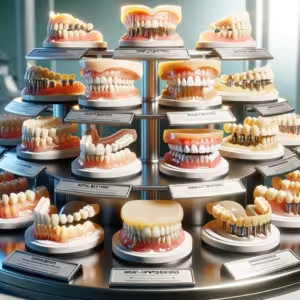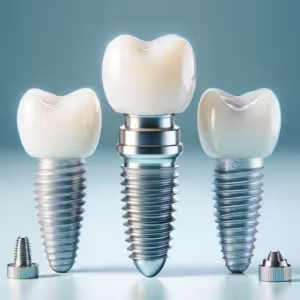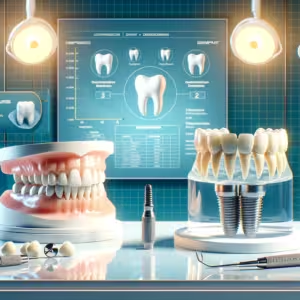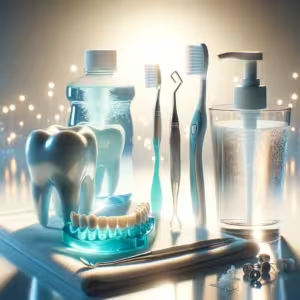Understanding Dentures
Understanding Dentures: A Comprehensive Guide
Dentures are removable dental appliances designed to replace missing teeth and restore the function and aesthetics of an individual’s smile. They play a crucial role in enhancing the quality of life for many older adults who may experience tooth loss due to aging, periodontal disease, or other health conditions. This guide will provide an overview of dentures, the different types available, and how they function to improve oral health.
What are Dentures?
Dentures are custom-made devices that replicate the appearance and function of natural teeth. They are typically made from acrylic resin, sometimes combined with metal, and are designed to fit comfortably in the mouth. The primary purposes of dentures include:
- Restoring Chewing Function: Dentures enable individuals to eat a wider variety of foods, contributing to better nutrition.
- Enhancing Aesthetics: They improve facial structure and restore a natural smile, which can boost self-esteem and confidence.
- Supporting Oral Health: Dentures help maintain the alignment of remaining teeth and prevent jawbone deterioration.
Types of Dentures
There are several types of dentures available, each catering to different needs and preferences:
1. Complete Dentures
- Description: Full dentures are used when all teeth in either the upper or lower jaw are missing.
- Function: They rest on the gums and are held in place by suction, and in some cases, adhesive.
- Indications: Ideal for individuals who have lost most or all of their teeth due to age or health issues.
2. Partial Dentures
- Description: Partial dentures are used when some natural teeth remain. They consist of replacement teeth attached to a gum-colored base.
- Function: They fill the gaps left by missing teeth and are anchored to the existing teeth using metal clasps or precision attachments.
- Indications: Suitable for individuals who want to maintain their natural teeth while replacing lost ones.
3. Implant-Supported Dentures
- Description: These dentures are secured in place by dental implants, which are titanium posts surgically placed into the jawbone.
- Function: They provide more stability and improved chewing efficiency compared to traditional dentures.
- Indications: Recommended for those who have sufficient bone density and prefer a more permanent solution.
4. Immediate Dentures
- Description: These are placed immediately after tooth extraction, allowing patients to avoid being without teeth during the healing process.
- Function: They provide a temporary solution that can be adjusted as the gums heal and reshape.
- Indications: Ideal for individuals who cannot afford to be without teeth during recovery.
How Dentures Function to Restore Oral Health
Dentures play a vital role in maintaining oral health for older adults in several ways:
- Chewing and Digestion: By restoring the ability to chew food properly, dentures help improve digestion and overall nutrition.
- Speech Improvement: Missing teeth can affect speech; dentures help to restore normal pronunciation and clarity.
- Jawbone Preservation: By providing stimulation to the jawbone, dentures can help prevent bone loss that occurs after tooth loss.
- Facial Structure Support: Dentures help maintain facial contours, preventing the sunken appearance that can occur with missing teeth.
Conclusion
Dentures are an invaluable resource for older adults dealing with tooth loss. By understanding the different types of dentures available and their functions, individuals can make informed decisions about their oral health care. Whether opting for complete, partial, or implant-supported dentures, the right choice can enhance quality of life, restore functionality, and promote confidence in social interactions. Consulting with a dental professional is essential to determine the most suitable option for individual needs.
Implant Dentistry Explained
Implant Dentistry Explained
Dental implants are advanced dental solutions designed to replace missing teeth and provide a permanent option for individuals seeking improved oral health and aesthetics. Unlike traditional dentures, which are removable, dental implants offer a fixed solution that mimics the function and appearance of natural teeth.
What are Dental Implants?
Dental implants consist of three main components:
- Implant Post: A small titanium post that is surgically placed into the jawbone, acting as a root for the replacement tooth.
- Abutment: A connector that connects the implant post to the crown (the visible part of the tooth).
- Crown: A custom-made replacement tooth that is designed to match the surrounding natural teeth.
Benefits of Dental Implants
Dental implants offer several advantages over traditional dentures, particularly for older adults seeking permanent solutions:
- Stability and Comfort: Implants fuse with the jawbone through a process called osseointegration, providing a stable foundation that eliminates the discomfort and movement often associated with dentures.
- Improved Functionality: Dental implants restore nearly full chewing ability, allowing individuals to eat a wider variety of foods without concerns about slippage or discomfort.
- Preservation of Jawbone: Unlike dentures, which can contribute to bone loss over time, implants stimulate the jawbone, thereby preventing deterioration and maintaining facial structure.
- Natural Appearance: Implants are crafted to blend seamlessly with existing teeth, enabling a natural smile and boosting self-confidence.
- Hygiene and Maintenance: Dental implants can be cared for like natural teeth, with regular brushing, flossing, and dental check-ups, making them easy to maintain.
The Procedure Involved
The dental implant procedure typically involves several steps, which may span several months but vary based on individual circumstances:
1. Initial Consultation
- Assessment: The dentist evaluates the patient’s dental and medical history, along with x-rays and scans to determine the suitability for implants.
- Treatment Plan: A personalized treatment plan is developed, including the number of implants needed and any additional procedures (e.g., bone grafting).
2. Implant Placement
- Surgery: The implant post is surgically placed into the jawbone under local anesthesia.
- Healing Period: Following the surgery, a healing period of several months is required for the implant to fuse with the bone.
3. Abutment Placement
- Second Surgery: Once healed, a minor surgical procedure is performed to place the abutment on the implant post.
- Additional Healing: This process may require additional healing time for the gums to recover.
4. Crown Placement
- Final Restoration: After the gums have healed, a custom crown is attached to the abutment, completing the restoration process.
- Follow-Up: Regular follow-up visits ensure the implant is functioning well and the surrounding tissues are healthy.
Recovery and Aftercare
- Post-Operative Care: Patients may experience some swelling and discomfort, which can be managed with prescribed medications.
- Oral Hygiene: Maintaining good oral hygiene is essential for the longevity of dental implants.
- Regular Check-Ups: Routine dental check-ups help monitor the health of the implant and surrounding teeth.
Conclusion
Dental implants represent a significant advancement in restorative dentistry, offering older adults a reliable and aesthetically pleasing option for replacing missing teeth. By understanding the structure, benefits, and procedure involved in dental implants, individuals can make informed decisions regarding their oral health care, with an emphasis on achieving a functional and confident smile. Consulting with a dental professional is essential to determine the most appropriate treatment for individual needs.
Choosing Between Dentures and Implants
Choosing Between Dentures and Implants
When faced with tooth loss, older adults often find themselves weighing the options of dentures versus dental implants. Each solution has its own set of advantages and considerations, making it essential to evaluate key factors before making a decision. Below are some important aspects to consider:
Cost Considerations
1. Initial Costs
- Dentures: Generally, dentures are less expensive upfront than implants. The cost can vary based on the type of denture selected, with complete dentures generally costing between $1,000 to $3,000 per arch.
- Dental Implants: Implants typically have a higher initial cost, ranging from $3,000 to $5,000 per implant. This cost includes the implant, the crown, and any necessary preparatory procedures (like bone grafting).
2. Long-Term Value
- Dentures: While they may be less expensive initially, dentures may need to be replaced or adjusted over time, adding to ongoing costs.
- Dental Implants: Implants can last a lifetime with proper care, often resulting in lower long-term costs compared to dentures, which may require replacements every 5 to 10 years.
Maintenance Requirements
1. Daily Care
- Dentures: Require daily removal for cleaning and must be soaked overnight in a denture solution to maintain their shape and hygiene. Regular cleanings by a dentist are also important.
- Dental Implants: Can be cared for like natural teeth, requiring regular brushing, flossing, and dental check-ups. They do not need to be removed, which can be more convenient.
2. Potential Repairs
- Dentures: They can wear down or become damaged, requiring repairs or relining. This can lead to additional costs and appointments.
- Dental Implants: Implants are less prone to damage but can require maintenance if complications arise, such as infection around the implant.
Lifestyle Impacts
1. Comfort and Fit
- Dentures: Some individuals may experience discomfort or difficulty adjusting to wearing dentures, especially initially. Ill-fitting dentures can lead to sore spots and discomfort.
- Dental Implants: Generally regarded as more comfortable and natural-feeling, as they are anchored directly to the jawbone.
2. Functional Benefits
- Dentures: While they restore functionality, some individuals may experience limitations in chewing certain foods, especially harder items.
- Dental Implants: Offer superior chewing ability, enabling individuals to enjoy a wider variety of foods without fear of movement or dislodgment.
3. Aesthetic Considerations
- Dentures: Dentures can improve aesthetics significantly, but some individuals may feel self-conscious about them appearing unnatural or shifting in the mouth.
- Dental Implants: Mimic the look and feel of natural teeth, providing a more permanent and aesthetically pleasing solution that can boost confidence.
Health Considerations
1. Bone Health
- Dentures: Do not prevent bone loss in the jaw, which can continue over time leading to changes in facial structure and further dental issues.
- Dental Implants: Help preserve jawbone density as they stimulate the bone just like natural tooth roots, minimizing the risk of bone loss.
2. Medical Factors
- Dentures: May be a suitable option for individuals with certain health conditions that preclude surgery.
- Dental Implants: Require sufficient bone density and health to support the implant. Individuals with certain medical conditions may need to explore other options.
Consultation with Dental Professionals
Before making a decision, it is crucial for older adults to consult with a dental professional. They can provide personalized recommendations based on individual health status, lifestyle, and budgetary considerations.
Key Questions to Discuss
- What is the state of oral and overall health?
- Are there any medical conditions that might affect treatment options?
- How does the individual prefer to manage their dental care routine?
Conclusion
The choice between dentures and dental implants is a significant one for older adults facing tooth loss. By considering factors such as cost, maintenance, lifestyle impacts, and overall health, individuals can make an informed decision that aligns with their needs and preferences.
Finding a Qualified Dentist in Ashburn, VA
Finding a Qualified Dentist in Ashburn, VA
When it comes to dental care, especially for older adults seeking dentures and implants, finding a qualified dentist is crucial. This guide provides tips and resources to help you identify suitable dental professionals in Ashburn, VA, along with important questions to ask during consultations.
Tips for Finding a Qualified Dentist
- Research Credentials and Experience:
- Look for dentists who are board-certified and have specific training in prosthodontics, which focuses on dentures and implants.
- Check the dentist’s experience in performing the procedures you need, including the number of cases handled.
- Ask for Referrals:
- Reach out to friends, family, or healthcare providers for recommendations.
- Consider joining local senior groups or online forums to gather insights from other older adults about their experiences with dentists in the area.
- Utilize Online Resources:
- Websites like the American Dental Association (ADA) and the Academy of Prosthodontics can provide directories of qualified dentists.
- Check local listings on Google, Yelp, or health insurance websites for reviews and ratings.
- Assess Office Environment and Accessibility:
- Visit the dental office to gauge its cleanliness and overall atmosphere.
- Ensure the office is accessible, especially if you have mobility issues. Look for features like ramps, elevators, and parking.
- Check Insurance Coverage:
- Verify if the dentist accepts your dental insurance plan, or inquire about payment plans for treatments that may not be fully covered.
Questions to Ask During Consultations
When you meet with a dentist, it’s important to ask the right questions to determine if they are the right fit for your needs:
- What is your experience with dentures and implants?
- Understand their background and the number of similar procedures they’ve performed.
- What types of dentures do you offer?
- Inquire about the options available, including complete, partial, and implant-supported dentures.
- What is the procedure for fitting and adjusting dentures?
- Ask about the timeline, fittings, and how adjustments are made for comfort and functionality.
- How do you handle aftercare and follow-up appointments?
- Clarify the process for post-treatment care and how often you will need to return for check-ups.
- What are the total costs involved?
- Request a breakdown of all costs, including exams, fittings, and any potential additional procedures.
- Do you provide emergency dental care?
- Ensure they have protocols in place for urgent issues that may arise with dentures or implants.
- Can you provide references or testimonials from previous patients?
- Speaking with others who have undergone similar treatments can give you valuable insights into the dentist’s care and quality.
By following these tips and asking the right questions, older adults in Ashburn, VA, can find a qualified dentist who meets their specific needs for dentures and implants, ensuring optimal oral health and a restored smile.
Preparing for Your Dental Procedure
Preparing for Your Dental Procedure: A Step-by-Step Guide
Getting dentures or implants is an important step in restoring oral health and improving quality of life for older adults. Proper preparation can significantly enhance the experience and outcomes of the procedure. Here’s a step-by-step guide to help you prepare effectively.
Pre-Treatment Care
- Consultation with Your Dentist:
- Schedule a thorough dental examination to assess your oral health.
- Discuss your medical history, including any medications and health conditions, to ensure safe treatment.
- Treatment Plan:
- Work with your dentist to develop a personalized treatment plan tailored to your needs.
- Understand the timeline and what to expect during the process.
- Oral Hygiene:
- Maintain good oral hygiene by brushing and flossing daily to ensure your mouth is healthy before the procedure.
- Consider using an antibacterial mouthwash to minimize the risk of infection.
Dietary Adjustments
- Soft Diet:
- Transition to a soft diet in the days leading up to your procedure. Focus on foods like yogurt, mashed potatoes, and smoothies to ease discomfort during healing.
- Avoid Hard and Sticky Foods:
- Eliminate hard, crunchy, or sticky foods that could cause damage to any remaining natural teeth or discomfort during the healing process.
- Stay Hydrated:
- Drink plenty of water to keep your mouth moist and aid in the healing process post-surgery.
Mental Preparation
- Educate Yourself:
- Learn about the procedure, recovery time, and what to expect afterward. Knowing what lies ahead can ease anxiety.
- Set Realistic Expectations:
- Understand that it may take time to adjust to dentures or implants. Be patient with yourself as you adapt to new appliances.
- Support System:
- Discuss your feelings and concerns with family and friends. Having emotional support can help ease anxiety.
- Relaxation Techniques:
- Practice relaxation techniques such as deep breathing, meditation, or gentle yoga to manage pre-surgery anxiety.
- Plan for Recovery:
- Arrange for assistance on the day of the surgery and for a few days afterward, if needed. Having someone to help can make the recovery process smoother.
Conclusion
By following these steps, older adults can better prepare for getting dentures or implants, ensuring a smoother transition and more positive experience overall. Proper pre-treatment care, dietary adjustments, and mental preparation contribute significantly to successful outcomes and improved oral health.
Post-Procedure Care and Maintenance
Post-Procedure Care and Maintenance
After receiving dentures or dental implants, following proper care and maintenance guidelines is essential for ensuring long-term oral health and function. This section provides detailed care instructions and tips tailored for older adults.
Essential Care Instructions for Dentures
- Daily Cleaning:
- Rinse dentures after meals to remove food particles.
- Use a soft-bristle toothbrush and a non-abrasive denture cleanser to clean dentures daily.
- Avoid using regular toothpaste, as it can be too abrasive and damage dentures.
- Soaking:
- Soak dentures in a denture cleaning solution overnight to keep them moist and clean.
- Ensure the solution is safe for the type of denture material used.
- Handling:
- Handle dentures carefully to avoid dropping or damaging them.
- When cleaning, do so over a soft towel or basin of water to cushion any accidental falls.
- Regular Adjustments:
- Schedule regular dental check-ups to evaluate the fit and function of the dentures. This is especially important as gums may change shape over time.
- Avoiding Stains:
- Limit consumption of staining foods and beverages, such as coffee, tea, and red wine.
- If staining occurs, consult with a dental professional for cleaning options.
Essential Care Instructions for Dental Implants
- Oral Hygiene:
- Maintain excellent oral hygiene by brushing teeth and implants at least twice a day.
- Use a soft-bristle toothbrush and floss designed for dental implants to remove plaque effectively.
- Follow-Up Care:
- Attend follow-up appointments as recommended by your dentist to monitor the health of the implants and surrounding tissues.
- Avoid Hard Foods:
- Avoid chewing on hard foods and objects (like ice or hard candy) that could damage the implants or surrounding teeth.
- Smoking Cessation:
- If you smoke, consider quitting. Smoking can impair healing and affect the success of dental implants.
- Recognize Warning Signs:
- Be alert for any signs of complications, such as swelling, pain, or bleeding around the implant site, and report these to a dentist immediately.
Maintenance Tips for Long-Term Oral Health
- Stay Hydrated:
- Drink plenty of water to help produce saliva, which is vital for oral health and helps keep dentures and teeth clean.
- Balanced Diet:
- Consume a well-balanced diet rich in vitamins and minerals to support overall health, which in turn promotes oral health.
- Limit Sugary Foods:
- Reduce the intake of sugary foods and beverages, which can contribute to plaque buildup and oral health issues.
- Use Dental Products:
- Consider using mouth rinses specifically designed for individuals with dentures or implants to enhance oral hygiene.
- Educate on Signs of Problems:
- Stay informed about potential issues, such as gum irritation or discomfort with dentures, and seek advice from dental professionals when needed.
Conclusion
Following these essential care instructions and maintenance tips is crucial for older adults to ensure the longevity and effective function of their dentures or implants. Adhering to a consistent cleaning routine, making regular dental appointments, and maintaining a healthy lifestyle greatly contribute to overall oral health. By prioritizing this care, individuals can enjoy improved quality of life and confidence in their smiles for years to come.






